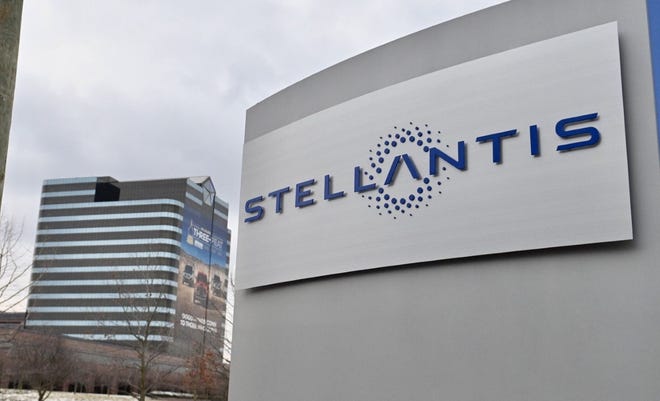Jeep maker Stellantis NV on Monday said it has retracted changes it made to its supplier contract terms earlier this year following a backlash from its vendors.
Among the least popular requirements of the new terms effective Jan. 1, 2022, were those that required suppliers to pass along to the transatlantic automaker any cost-savings incurred and allowed Stellantis to extend the length of an agreement. The company is seeking to achieve a 40% to 50% reduction in the expense of producing a vehicle to make up for the increased cost of electric vehicles over internal combustion engine-powered cars.

The changes came alongside efforts to make uniform the ways of doing business between the former divisions of Fiat Chrysler Automobiles NV and French automaker Groupe PSA prior to their merger that created Stellantis last year, Martin Horneck, head of purchasing and supply chain for Stellantis in North America, said in a letter to suppliers on Monday.
“One of these processes was to create a Global Terms and Conditions for the global purchasing organization,” he wrote. “As we’ve worked through this process, and heard your feedback, we understand that each region has unique attributes related to the business in that region, and that those attributes cannot be ignored.”
The changes prompted outrage from the supplier base unlike anything attorneys representing the vendors have seen before, with some saying they would refuse to bid on future Stellantis business or require individual modifications, potentially increasing costs for Stellantis. Despite high vehicle transaction prices resulting in major profits for automakers and dealers, suppliers typically are locked into fixed-price contracts and are bleeding from inflation, higher raw-material prices and labor shortages.
“These terms really were intolerable,” said Sheldon Klein, co-chair of law firm Butzel’s global automotive coordinating committee. “The normal terms of purchase in the industry are incredibly one-sided. These took it up several notches. It went form incredibly one-sided to remarkable that they would have to expect their suppliers to sign up for these terms.”
That’s why there was “jubilation,” Klein said, when he shared the news to clients on Monday about the changes to the terms, though he was told by suppliers the terms in the company’s supplier portal hadn’t been updated as of Monday morning. The reinstatement of the 2021 FCA US LLC Terms and Conditions went live at 8:30 a.m. Monday, according to Stellantis.
The announcement comes after Stellantis last week said Michelle Wen, the company’s chief purchasing and supply chain officer, was stepping down to “pursue personal projects.” Starting June 1, Maxime Picat, who currently is in charge of the automaker’s enlarged Europe region, will replace her as the automaker faces a global microchip shortage and warns of other potential supply-chain crises.
Production stoppages from parts shortages has led to depleted inventory levels and caused vehicles prices to jump. That contributed to a 12% increase in revenue to $44 billion for Stellantis in the first three months of the year even as shipments fell by the same percentage year-over-year.
Meanwhile, suppliers are struggling with profitability from increasing steel prices and political and economic uncertainties. Robert Bosch GmbH earlier this month said it will have to pass on rising costs to its customers.
Stellantis’ contract terms had prompted suppliers to walk away from bidding on new work for the automaker, Klein said. In recent weeks, the company was making concessions to major supplier. Klein declined to detail what those looked like.
“They can’t be negotiating individual deals with all of their suppliers,” he said. “They have to have standard terms that work with the vast majority. It’s very expensive to have terms that individually differ.”
Stellantis spokeswoman Jodi Tinson in an email said Stellantis had not seen any companies stop doing business with the automaker, though it declined to comment on whether there had been a decrease in the number of bidders for its work.
“This reinstatement will have no impact on our goals,” Tinson said regarding Stellantis’ cost-savings goals. “We will continue to work with suppliers to address issues and concerns on a case-by-case basis.”
Stellantis’ retraction of its terms isn’t unprecedented, though typically automakers have the greater authority in negotiations with vendors, Klein said. Stellantis’ decision shows suppliers aren’t without power. Whether this portends a broader ability to resist stricter terms, however, remains unclear.
“These Stellantis terms were uniquely oppressive,” Klein noted.
Unilateral pricing decisions by automakers trace to the 1990s, and they rarely are reversed, said Van Conway, president of Young Conway Group, a Detroit advisory firm. Because of the economic crisis in 2008 and 2009, though, many suppliers went out of business.
“Weak suppliers disappeared,” Conway said. “They learned they can’t rely on only one customer. Effectively, the supply chain is stronger now. It’s a sound decision by Stellantis that happens to be good for the supply base.”
Stellantis CEO Carlos Tavares previously has said suppliers represent 85% of the production costs of a vehicle. Stellantis is seeking 10% annual expense savings to avoid making EVs unaffordable to middle-class buyers and to maintain double-digit profit margins.
“When you have to absorb 50% of additional costs coming from electrification,” Tavares said in February, “your suppliers need to be significant contributors, as they have been enjoying this cost structure over the past 30 years, so yes, they have to contribute.”
Even before implementing the more unfavorable supplier terms, though, Stellantis has had rocky relations with its vendors. Its U.S. operations ranked last of six major automakers in accounting firm Plante Moran’s Working Relationship Index last year. Its score plunged 28 points in 2021 year-over-year, a 14% drop. The 2022 index will be released next week.
“We appreciate your input and feedback into this process,” Horneck concluded in the letter to suppliers. “We will work to continue to align with our supply base and aim for continued success for our respective organizations.”
bnoble@detroitnews.com
Twitter: @BreanaCNoble